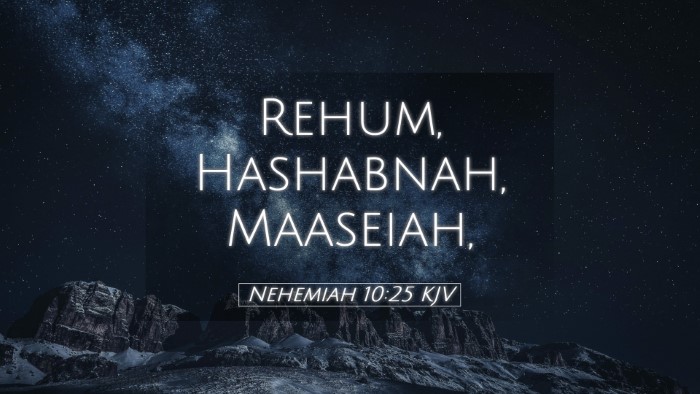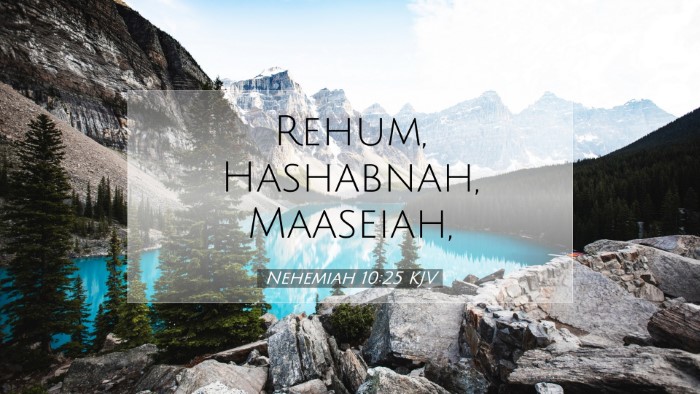Commentary on Nehemiah 10:25
Verse: Nehemiah 10:25
"And we cast the lots among the priests, the Levites, and the people, for the wood offering, to bring it into the house of our God, after the houses of our fathers, at times appointed year by year, to burn upon the altar of the Lord our God, as it is written in the law."
Introduction
Nehemiah 10:25 represents a pivotal moment in the restoration of the Jewish community after their return from exile. This verse illustrates a conscientious effort to ensure the continuity of worship and sacrifice. The specifics of the wood offering, a vital component in the sacrificial system, underscore the necessity of careful organization and commitment to the law of Moses. The commentaries of renowned theologians like Matthew Henry, Albert Barnes, and Adam Clarke offer profound insights into this passage, emphasizing its theological significance and practical implications for the community of faith.
Theological Insights
-
Divine Order in Worship:
Nehemiah’s action of casting lots for the wood offering signifies a structured approach to worship. Matthew Henry notes that proper attention must be given to the means and materials of worship. An organized provision for such offerings reflects respect for God’s laws and His designated order (Henry). This suggests that God desires His people to engage in worship through deliberate and thoughtful actions.
-
Covenantal Responsibilities:
The offerings were not merely a tradition; they represented a covenantal responsibility. Adam Clarke highlights that the wood offering reflects the collective commitment of the community to uphold the divine requirements given in the law. This act signifies the importance of fulfilling God’s commandments, echoing the themes of obedience and faithfulness that permeate the narrative of Nehemiah.
-
Symbolism of Sacrifice:
The act of bringing wood for sacrifice is significant as it symbolizes the necessity of maintaining the sacrificial system that points to Christ. Albert Barnes elaborates on how sacrifices in the Old Testament foreshadow the ultimate sacrifice of Jesus Christ. This connection emphasizes the ongoing relevance of the Old Covenant in light of the New Covenant.
Historical Context
The social and political climate during Nehemiah's time was challenging, as the people were working to rebuild their lives in a city that had been devastated. This verse highlights not just the physical rebuilding of Jerusalem, but also the spiritual reconstruction of the Jewish identity, which had been influenced deeply by their Babylonian exile. Nehemiah’s leadership brings about a renewed commitment to the Law, of which communal offerings like the wood offering were a vital aspect.
Practical Applications
-
Community Involvement in Worship:
The casting of lots involved the entire community in the process, suggesting a model for contemporary churches. Pastors and church leaders can reflect on the essence of communal participation in worship and offerings, encouraging congregants to take an active role in supporting the ministry.
-
Pursuing Faithful Stewardship:
Just as the Israelites were called to provide for the temple's needs, modern believers are called to practice stewardship in their churches and communities. This involves not only financial contributions but also offering time, skills, and resources to the work of God.
-
Emphasizing the Law and Worship:
Nehemiah’s commitment to uphold the law serves as a reminder of the importance of Scripture in guiding worship practices. Churches today can benefit from returning to biblical foundations for worship and ensuring that practices align with scriptural teachings.
Conclusion
Nehemiah 10:25 encapsulates a profound moment of commitment and order in the worship life of the restored Jewish community. By examining insights from Henry, Barnes, and Clarke, we gain a deeper understanding of the importance of organized worship, communal responsibility, and the legacy of sacrifice that ultimately points to Christ. This verse serves as an encouragement for modern believers to engage heartily in the worship of God, recognizing it as both a privilege and duty, vital for spiritual renewal and community integrity.


